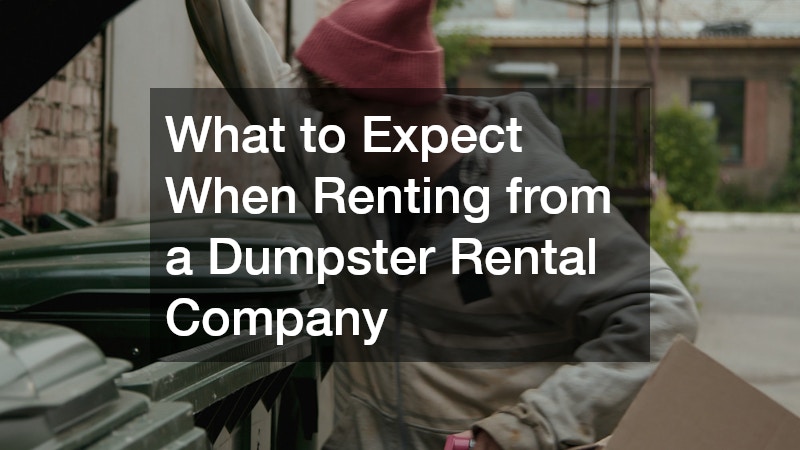Renting a dumpster can be an essential component of any significant project, whether that involves home renovations, decluttering, or construction work. The process of renting a dumpster is not merely about having a larger bin for waste; it also involves understanding the specifics of waste disposal, regulations, and logistics. In this article, we’ll provide you with in-depth insights into what you might expect when renting from a dumpster rental company. Through our detailed sections, we’ll guide you from choosing the right dumpster size to comprehending the delivery and pickup process.
Dumpsters can be incredibly useful for various tasks, from spring cleaning to tackling extensive construction jobs. The convenience of having a designated space for waste allows for better organization during project execution. Understanding the different aspects of renting a dumpster can help you save time, money, and effort as you embark on your project.
As you read through this article, we hope to arm you with valuable information that helps you make informed decisions when renting a dumpster. This knowledge can lead to a smoother and more efficient waste disposal process, tailored specifically to your project’s needs.
How Do I Choose the Right Dumpster Size?
Choosing the right dumpster size is crucial to ensure you have enough space for all your waste without overpaying for an unnecessarily large bin. Considering the type of waste you’ll generate is a great starting point for size selection. Common dumpster sizes include 10, 20, 30, and 40-yard containers, and each is suitable for different project scales.
For smaller projects like garage cleanouts or yard work, a 10 or 20-yard dumpster is usually sufficient. However, if you’re undergoing a significant renovation or a large construction project, you may need a 30 or 40-yard dumpster. Understanding the volume of your waste can help you choose wisely, preventing overflow and the hassle of additional trips for pickup.
Additionally, be sure to communicate any specific needs or questions you have with the rental company. They can assist you in selecting the best option based on your project’s scope. The wrong size could lead to unexpected costs and delays, so consider all factors before making your selection.
What Are the Typical Rental Terms and Costs?
Rental terms and costs can vary widely between dumpster rental companies, making it essential to understand the standard agreements. Generally, prices are based on the size of the dumpster, the rental duration, and the type of debris. Knowing these parameters can help you budget appropriately for your project.
Rental durations often range from a few days to several weeks, depending on your project scope and needs. Many rental companies allow you to extend your rental period for an additional fee, which can provide flexibility if your project runs longer than anticipated. However, be cautious of any potential overage charges that can quickly accumulate.
Additional costs may also arise based on the type of material disposed of, weight restrictions, and any fees for prohibited items. It’s wise to read the fine print and ask specific questions about pricing to avoid surprises. By being informed, you can make comparisons more easily between various rental options and secure a deal that aligns with your budget.
What Materials Are Allowed in a Dumpster?
When renting a dumpster, understanding what materials are permitted is crucial for compliance and avoiding additional charges. Most rental companies allow common waste types, including household debris, construction debris, and yard waste. It’s important to separate materials properly to maximize dumpster use efficiently.
However, specific items are typically prohibited and should never be thrown in a dumpster, such as hazardous materials, chemicals, batteries, and electronics. These materials may have stringent disposal regulations and might require specialized handling. Familiarizing yourself with the local regulations on waste disposal can help avoid potential fines or issues.
How Does the Delivery and Pickup Process Work?
The delivery and pickup process of dumpster rental is an essential aspect that many people overlook. When you arrange for a dumpster rental, you will usually have the option to choose a convenient delivery date that aligns with your project timeline. It’s important to be present during delivery to discuss placement needs and specific instructions with the driver.
Placement is a vital consideration, as you want to ensure that the dumpster is accessible yet does not obstruct your project site. Communicate clearly with the rental company about any obstacles or specific requests regarding where the dumpster should be positioned to avoid potential issues down the line.
Upon completing your project, the pickup process is typically straightforward as long as you have informed the rental company that you are finished. Ensure the dumpster is not overloaded and is free from prohibited items before the pickup. These simple steps can help facilitate a smooth transition from rental to pick up, leaving you with fewer concerns on your project’s completion.
In summary, understanding the intricacies of renting a dumpster can significantly enhance your project management and waste disposal processes. By selecting the right size dumpster, knowing rental terms and costs, being aware of allowed materials, and navigating the delivery and pickup logistics, you can set yourself up for success.
